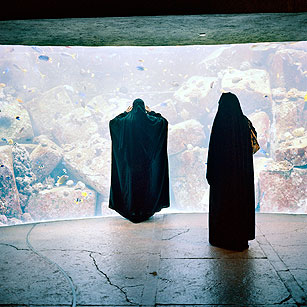
Transfixed Traditionally garbed Muslim women seem entranced by an exhibit at the Atlantis aquarium in Dubai
In China, Ibn Battuta writes, he heard once of a cave-dwelling man, more than 200 years old, who never ate, never drank and never spoke. Upon seeking him out, the intrepid Moroccan traveler watched the sage seize his hand, smell it, then pronounce, "This man is just as much attached to this world as we are to the next." With that, the aged ascetic — apparently breaking his vow of silence — also told his visitor that they had met before and then stepped into his cave, never to appear again.
A pious, well-trained magistrate, Ibn Battuta reported this puzzling encounter to a local judge and heard of a businessman who had previously visited the sage, imagined himself in a large palace before a crowned sheik, seen what looked to be "fruits falling into streams" and, having eaten of these hallucinated fruits, was sick for many months.
There, perhaps, you have Ibn Battuta in miniature: an engaging mix of mystery and precision, throwing together matter-of-fact accounts of signs and wonders with savory details of life as it was. The reason we still read him more than 650 years after his travels concluded is that his attitudes, travails and writerly gambits are startlingly similar to those we might meet or deploy today yet are flavored with his incorrigible personality and details of a world nobody evoked quite as he did.
Ibn Battuta set out from his native Tangier in 1325 as a devout Sufi pilgrim and something of a religious anthropologist, eager to record the sacred sites, saints and small fables of pride and devotion he discovered along the way to Mecca. But having completed the hajj in a year and a half, he kept traveling for 28 more years. As with the very best travelers, he seems to have begun by taking a journey — and then found that the journey had taken him over. The result was not just the Muslim Pilgrim's Progress he had intended but a global anthology of marvels. Ibn Battuta spoke for a kind of archetype we still see everywhere even in the age of MapQuest.
The Rihla, or travel book, was a common form in the North Africa of his day, commissioned by sultans to give readers back home a sense of the great intercontinental network of Islamic fellowship and prayer. Ibn Battuta was doing nothing very unusual when he set out from his family of legal scholars — not unlike the wellborn and well-connected Englishmen of four centuries later who embarked on a grand tour to visit such centers of learning and culture as Paris and Florence and Venice. (Though Ibn Battuta went to Damascus and Cairo and Medina.) Wherever he traveled in the Dar al-Islam, he ran into other learned jurists like himself, who offered him shelter and hospitality, gave him slave girls and commissions and sometimes set him up with traveling partners.
Yet even as he moved in high style, the fact that he kept on — and on — traveling, well beyond his original itinerary, ensured that his adventures were often uncannily close to those of many an every tourist of today: he caught malaria, he found his guides turning treacherous, and at one point he saw the Chinese junk that he was due to board go down at sea while another vessel, transporting his servants and his concubines (one of whom was carrying an unborn child of his), sailed off toward an unknown port. We see him set upon by bandits, hiding in a ditch to avoid attackers, passing through a Cairo in which 21,000 people every day are dying of the plague.
Strange New World
So the man who begins his account presented as a figure of "courage, religious confidence and indefatigable perseverance," recording the wisdom of saints — one clairvoyantly tells him to look up colleagues in faraway India and China, and lo and behold, the young traveler ends up doing so — goes on to offer wide-eyed descriptions of places that to many of his readers must have seemed as remote as the moon. He writes of a magician who "assumed the form of a cube and arose from the earth" and of women who could kill men with a glance; he tells of seeing a man cut off his own head as a sign of devotion to his ruler and of a palace constructed so as to collapse on anyone who enters as soon as an elephant comes in contact with it. Assembling a kind of Thousand and One Nights in reverse, Ibn Battuta was like a thousand travelers today who eagerly inform us that getting lost proved more fruitful than finding their hoped-for destination.
The other thing that marks him out is the way he cannot fail to remake every place he sees (as many a defining traveler does) in the light of his own beliefs and opinions. When affronted by the sound of Catholic bells in Crimea, he runs up to the top of a minaret and begins chanting from the Koran. Taking a job as a magistrate in the Maldives, he institutes a system whereby men who fail to attend Friday prayers are "whipped and publicly disgraced." In Mali a Sultan declines to give him enough presents, and Ibn Battuta threatens him with bad reviews. (The Sultan promptly gives him a house.) In Delhi, when condemned to seeming death, he tells us that he recites a prayer 33,000 times and somehow survives.